WHAT IS MARKET AUTOMATION
In a continually evolving digital world, businesses are faced with new customer expectations, market demands, and competitors. Companies are consistently looking for smarter ways to drive customer engagement, generate leads, and ultimately close sales. One of the best ways to remain connected with customers is through marketing automation. In this ultimate guide, we’ll explain what marketing automation is, tools and software behind marketing automation, the best marketing automation platforms available for you, and how marketing automation can fit into a Customer Relationship Management (CRM) system to provide a phenomenal customer experience.
Marketing automation is the process of using technology and software to automate repeatable tasks, improve workflow processes, and report on the success of the marketing effort across many channels. Instead of sending emails, social media posts, and tracking leads manually, you can use marketing automation software to do those things automatically based on rules, triggers, or customer behavior.
The primary function of marketing automation is to provide a reliable and efficient way to manage many elements of marketing and enhance a personal level of engagement with your customers. For example, when a potential customer visits your site and downloads a white paper, with marketing automation you can, for example, automatically add them to a segmented list and send a series of emails specifically designed for that customer’s interests. Increasing the speed and efficiency of the workflow is a benefit, but the consistency and accuracy of the communication can be just as significant.
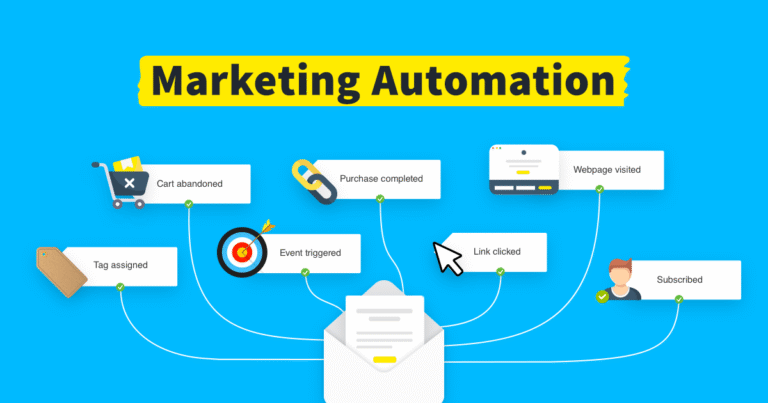
The overall point of marketing automation is to nurture leads through the customer journey from awareness to purchase, and sometimes through to after sale support. Organizations that effectively implement marketing automation report increased conversions, revenue and retention, and better analytics to create smarter decisions in the future.
In addition, marketing automation is not only about email. There are a variety of different channels that can be utilized in marketing automation, such as SMS, chatting applications such as WhatsApp, social media, web forms and landing pages, chatbots, and even offline campaigns/the mail. All this can be delivered through the same platform. This means that businesses can reach and engage with customers wherever they are, and provide a seamless customer experience with consistent messaging across all channels.
Marketing automation is also important for scale. Businesses and their customer bases grow tremendously, so it seems unrealistic to be manually managing hundreds or thousands customer interactions. Automation can help because it can help ensure that every customer interaction is timely and relevant, while remaining aligned with the business’ overall strategy.
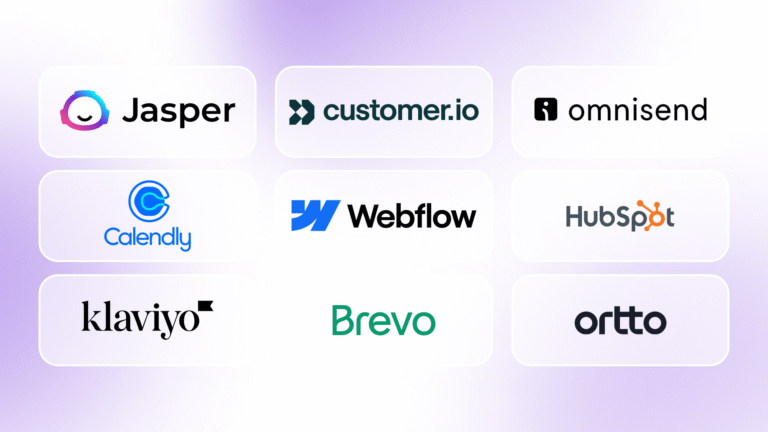
WHAT IS MARKET AUTOMATION TOOLS
In order to leverage marketing automation, companies are utilizing a wide variety of market automation tools, each designed to complete a specific task. The following are the most common marketing automation tools:
1. EMAIL MARKETING AUTOMATION TOOLS
Email is often regarded as the most powerful channel to engage customers, which is why email market automation tools are at the core of most automation strategies. Email market automation tools such as Mailchimp, Constant Contact, and Sendinblue allow companies to create email campaigns, design scheduled campaigns (still a staple of email marketing) and personalize mass email campaigns based on customer behavior (email rhythms). They also provide dripping campaigns, A/B testing, email segmentation, monitoring key metrics, and automated analysis backed up by large volumes of data.
2. SOCIAL MEDIA AUTOMATION TOOLS
Companies recognize the need to have an active presence across their social media channels (Facebook, Instagram, LinkedIn, and Twitter). However, maintaining this presence can be rather time-consuming. Social media market automation tools like Buffer, Hootsuite, and Sprout Social allow companies to schedule social media posts, track social media conversations, and analyze metrics and engagement across all social media channels. Some social media market automation tools even suggest optimal times to post and offer auto-responses to frequently asked questions.
3. TOOLS FOR CUSTOMER JOURNEY MAPPING
Understanding and mapping the customer journey is central to automation. Platforms like HubSpot and Marketo Engage allow marketers to create workflows that represent the stages of the buyer’s journey and to automate associated marketing touchpoints.
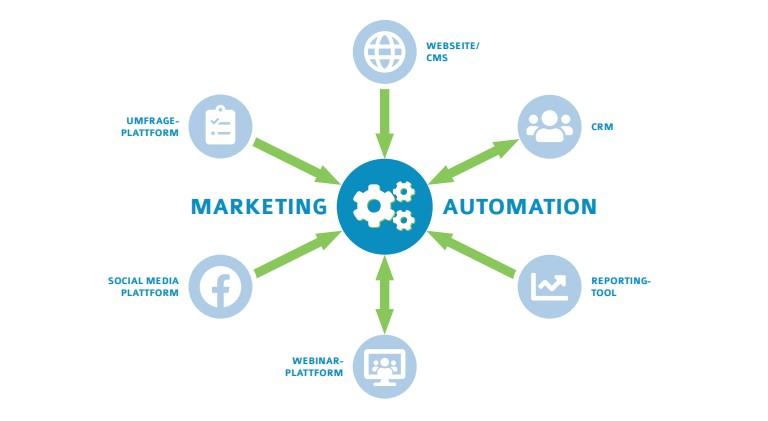
4. LEAD SCORING AND MANAGEMENT TOOLS
Not all leads are the same. There are many platforms available that score leads based on interactions and behavior. Tools like Pardot, ActiveCampaign, or Zoho CRM help businesses categorize leads as they interact with marketing campaigns so the sales team can focus their time on the prospects which present the most potential.
5. LANDING PAGE AND FORM BUILDERS
Generating leads often starts with well-designed landing pages and forms. Tools like Unbounce, Instapage, and Leadpages can help marketers build landing pages that convert and connect with their CRM and marketing automation system.
6. ANALYTICS AND REPORT TOOLS
No marketing strategy can be truly effective without measurement. Google Analytics, Tableau, and built-in reporting functions from market automation tools can give marketers valuable insights into campaign performance, customer engagement, and ROI. Once integrated, businesses can operate in an interconnected ecosystem with data flow, streamlined processes, and optimized customer engagement.
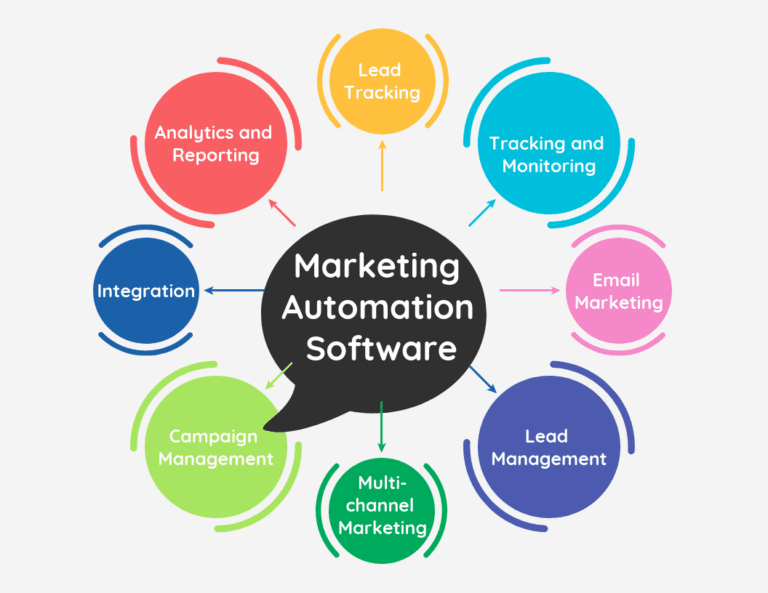
MARKET AUTOMATION SOFTWARE
While each tool serves a specific function, marketing automation software offers a broader solution combining multiple functionalities into one platform. Each one of these software options is designed to fulfill the management of an entire campaign from start to finish, making it an ideal fit for any business wanting to scale their efforts.
For example, HubSpot Marketing Hub is a well-packaged all-in-one software that provides email marketing, social media scheduling, search engine optimization (SEO), landing page functionality, analytics, and integrates to a customer relationship management (CRM) platform. HubSpot is well-known for being highly user friendly and having a powerful recipe that makes it a go to option for many small and medium-sized businesses.
Similarly, Marketo Engage (Adobe) is enterprise-level software aimed at large organizations. Marketo Engage provides advanced features not found in marketing automation start-ups which include AI-tool recommendations related to content, multi-touch attribution, lead nurturing workflows, and enhanced analytics.
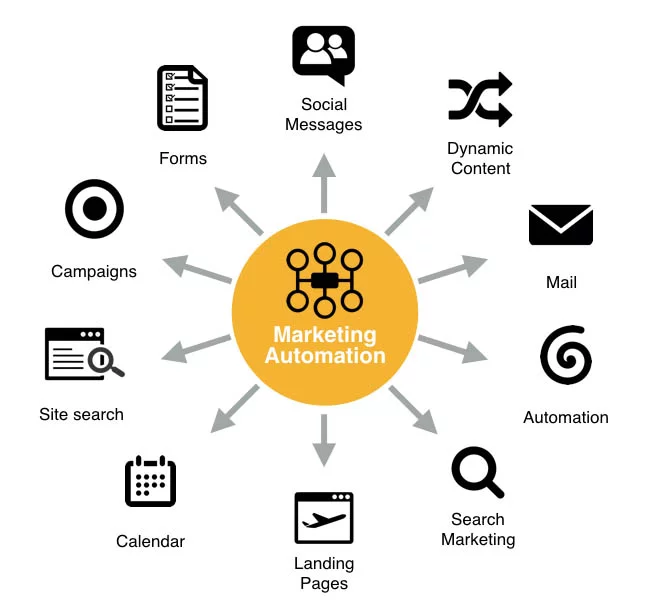
Although ActiveCampaign is not at the enterprise level, it prides itself on affordability and a user-friendly nature, for small businesses who want to access advanced email marketing, automation workflows, and CRM functions without extensive training.
Other notable mentions include, Pardot by Salesforce is attractive to any B2B company looking for sophisticated lead management, while Eloqua by Oracle considers itself heavy hitters offering advanced targeting and personalization capabilities for any large campaign.
These solutions that exist as software are cloud-based, customizable and scalable. Most will integrate with third party apps so cross-departmental and systems collaboration is seamless.
What is Market automation software is an investment many businesses make to stop disparate marketing efforts and data silos, and create a consistent customer experience. This process of consolidating all marketing programs allows teams to act strategically and creatively, allowing the software to work through the highly repetitive and data driven process of marketing.
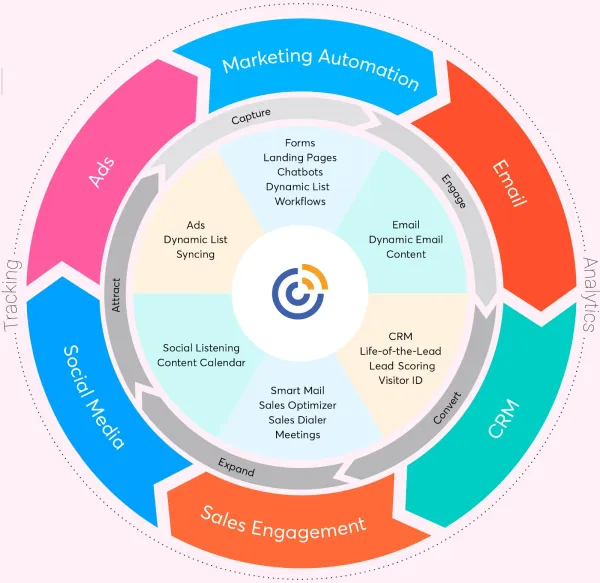
What is Market automation software refers to a complete and comprehensive suite of digital tools crafted to automate, streamline and measure marketing activities and workflows. These software solutions provide many different features (such as email marketing, lead scoring, customer segmentation, social media scheduling, analytics and reports, campaign, and asset management) under one roof. It is designed to help organizations save time on repetitive tasks and improve the organization of work by reducing bottlenecks and miscommunication, to create personalized, target communications to their clients in a scaled manner.
The software is more than using one tool, what is market automation software is an all-in-one solution to ensure communication data flows as one between different marketing channels and touchpoints, to create a complete customer experience. Marketing automation software types such as HubSpot, Marketo Engage, ActiveCampaign, Pardot and Eloqua serve organizations of all sizes, from small businesses to enterprise organizations with capabilities to customize tools for different customer journeys. Automated systems put organizations in a proactive position that enables them to create sophisticated workflows that nurture leads throughout the sales funnel, design behavior triggered campaigns, and track customer interactions across many different touchpoints, while ensuring the messaging is always consistent and accurate.
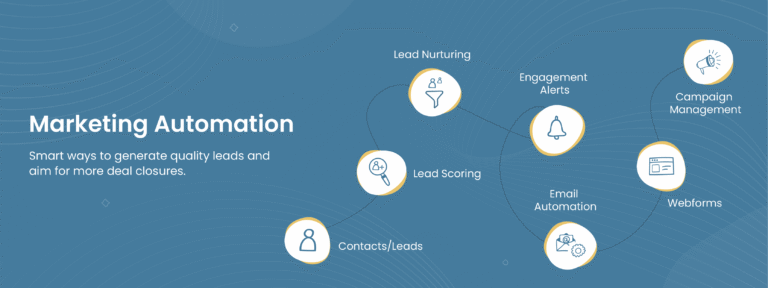
One of the most compelling benefits of implementing what is market automation software is that as an organization grows, so does its scalability, and that its powerful analytics and reporting capabilities provide practical insights into customers. What is Market automation software collects large sets of data on customers and analyzes it to uncover patterns, behaviors, and preferences, allowing marketers to improve their marketing strategies and increase the return on investment.
In addition to scalable customer insights, most modern marketing automation software integrates nicely with CRM systems, sales platforms, and other tools used in most organizations, creating a seamless connection between the marketing department, sales department, and other stakeholders.
Organizations can now even access sophisticated capabilities in the market like AI recommendations, predictive lead scoring, dynamic content personalization, and more towards campaign actions and decision-making highlighting multi-touch attribution modeling to remain competitive in the market that is completely powered by data. Whether B2B or B2C, marketing automation software is critical for success in the future especially not only to help marketers focus less on manual tasks as we produce more content than ever, taking away from creativity, strategy, customer relationship development, but to enable sustained growth for their business.
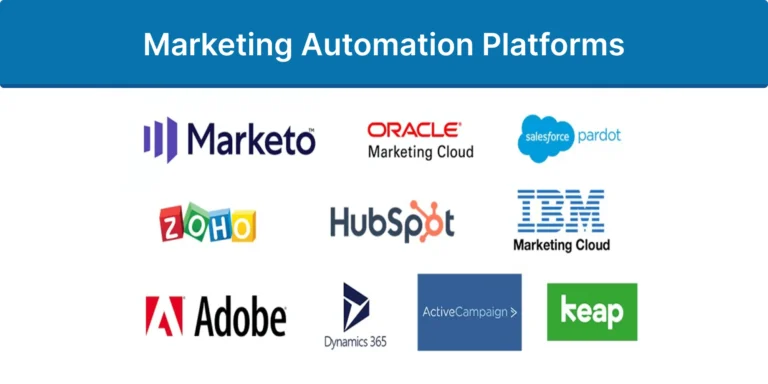
MARKET AUTOMATION PLATFORMS
The terms software and platform are often used interchangeably, except marketing automation platforms are typically considered a larger ecosystem that connects many tools, apps and data sources into a consolidated what is market automation operation.
Marketing automation platforms are in fact the operating system of digital marketing – they manage the orchestration of campaigns, unify customer data, and deliver information in real-time. Examples of popular platforms include the following:
1. SALESFORCE MARKETING CLOUD
This platform provides a complete suite of tools for email, social, advertising, mobile messaging, web personalization, and more. Salesforce’s platform allows for great integration with Salesforce CRM, making it an efficient alignment of marketing and sales.
2. ADOBE EXPERIENCE CLOUD
With a focus on delivering personalized customer experiences at scale, Adobe’s platform seamlessly combines content management capabilities, customer analytics, AI-driven insights, and their automation abilities to help brands create campaigns across all platforms.
3. ORACLE MARKETING CLOUD
Oracle’s offerings include Eloqua, Responsys and BlueKai, and they give marketers the most sophisticated ability to segmentation, target, and manage cross-channel campaigns.
4. HUBSPOT PLATFORM
Often mistaken as a platform for small businesses, HubSpot’s platform connects marketing, sales, service and a CMS to form a solid integration where teams actually work together and facilitate the customer journey.
5. ZOHO MARKETING PLUS
Zoho’s software is designed for growing businesses and combines email, social, surveys, webinars, and CRM in a single interface for a competitive price. Platforms like Zoho do more than just automate tasks — they allow businesses to deliver personalized, data-driven experiences across all channels, so every customer practices relevant, individualized customer experience. A marketing automation platform will enhance organizational effectiveness by reducing departmental silos, increasing data accuracy, and enabling marketing, sales, and service teams to collaborate.
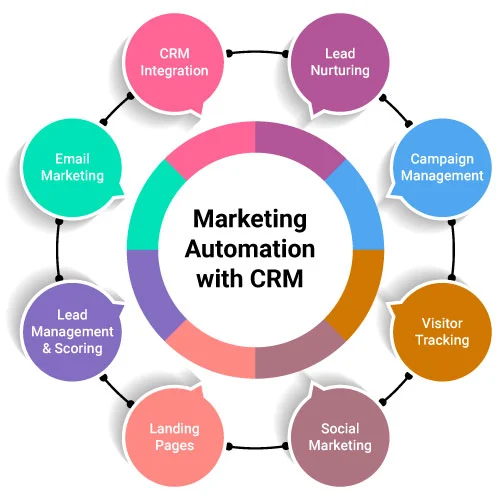
Marketing automation platforms are complex, enterprise-class technologies to plan and manage complex multi-channel marketing campaigns. What is Market automation platforms are not like single-purpose tools or point solutions, but a complete, integrated collection of fully comprehensive, automation, analysis and engagement capabilities in a single, integrated ecosystem. Marketing automation platforms provide the ability to plan and execute sophisticated multi-step customer journeys incorporating email, social media, SMS, web cache and personalization, advertising and more from a single integrated application.
A platform like Salesforce Marketing Cloud, Adobe Experience Cloud, Oracle Marketing Cloud and HubSpot is recognized as a what is market automation platform that provides a rich menu of technology considerations. Marketing automation platforms function beyond mere task automation, but centralize customer record data to create customized, segmented audiences with personalized experiences, triggered in varying volumes and at scale. Marketing automation platforms additionally, facilitate advanced marketing capabilities in programmatic advertising, dynamic content generation, real time behavioral tracking, AI driven optimizations and omnichannel orchestration making these a critical technology consideration for organizations of Mid-Size to larger who require to mobilize data to execute a scalable marketing strategy.
MARKET AUTOMATION AND CRM (CUSTOMER RELATION MANAGEMENT)
One of the most impactful features of what is market automation is its integration with Customer Relationship Management (CRM) systems. CRMs manage customer data, record interactions, and oversee the entire sales process. CRMs like Salesforce, Zoho CRM, and Microsoft Dynamics 365 can benefit from marketing automation by creating the link between marketing and sales.
Here are a couple of reasons why market automation is so important.
1. UNIFIED CUSTOMER DATA
With what is market automation, customer data including behavior on websites, email engagement, social media interactions, and much more, is collected and stored. When synced with a CRM, a sales team now can see a 360-degree view of each lead or customer, which makes for more informed conversations and targeted follow-up options.
2. NURTURING BETTER QUALITY LEADS
Not every lead is ready to buy immediately. What is Market automation nurtures leads with personalized campaigns until the contacts are ready, where it then transfers to the CRM, providing important details including lead score, lead interests, and lead history. By providing this level of detail, sales reps can now prospect more effectively.
3. STREAMLINED WORKFLOWS
Integration makes manual data entry and errors a thing of the past. When actions occur in the CRM, such as moving a lead along to the next stage, it will initiate a marketing automation action that has content mapped in to keep both teams in sync.
4. IMPROVED CUSTOMER EXPERIENCE
Together, CRM and what is market automation deliver timely, relevant, and personalized communications for customers whether they receive it from marketing or sales.
5. IMPROVED REPORTING AND ANALYTICS
Reporting can now combine the analytics from both systems when you measure the entire customer journey from first touch to conversion and beyond. This enables the business to determine the value of each campaign and improve ROI.
For example, a potential customer who attended a webinar may be sent an email series via the marketing automation system, while the CRM records the customer’s journey through the sales funnel. If the potential customer is interested in a demo, the CRM will alert the sales team — all beautifully designed to happen.
In a customer-centric, marketplace, separate departments (marketing, sales, etc.) are not an option. Integration of marketing automation, CRM, and sales helps organizations create a work environment driven by collaboration and data; strategies for growth and customer retention can then begin to be formulated.
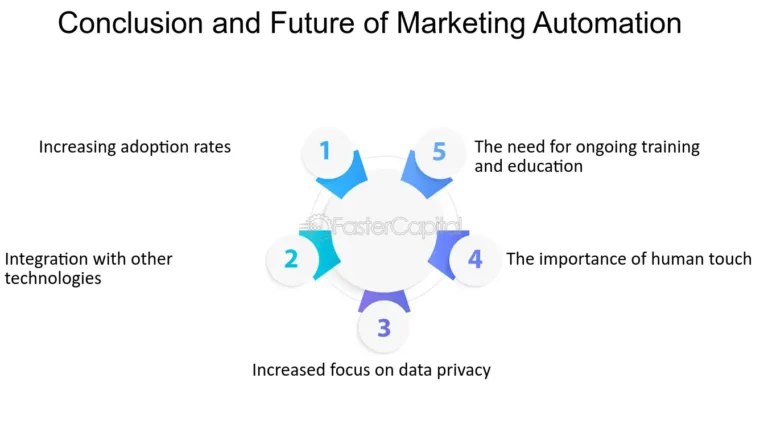
CONCLUSION
What is Market automation has transformed how businesses engage with their customers. It offers teams the ability to automate repetitive tasks, providing insights and data bidding employees a chance to engage personalized engagement and relationships as opposed to often mundane tasks. Therefore, employees are working to improve strategies, move creative ideas forward, and ultimately build relationships.
Whether you’re new to what is market automation or want to upgrade an already existing what is market automation initiative, it is important to take time upfront to understand the landscape and how it looks with tools, software, platforms, and CRM integration. You need to be able to utilize the proper solutions that work with your business to fulfil goals but also scale as you grow, and come out of the box integrated.
The automatic future of marketing is clear – but there is always a human element to the automated future. I believe with the help of marketing automation, businesses can help to be efficient but also provide experiences that turn customers into loyal customers in the future – which gives you the best future possible.
